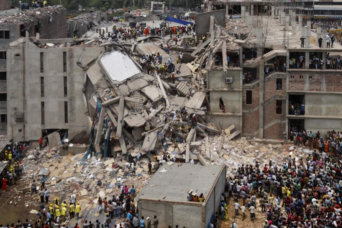- About
- Topics
- Story
- In-Depth
- Picks
- Opinion
- News
- Donate
- Signup for our newsletterOur Editors' Best Picks.Send
Read, Debate: Engage.
Five years ago, when workers arrived at the Rana Plaza building to carry out their jobs, many of them refused to enter the eight storey garment factory when faced with the deep cracks that had appeared in the walls the previous day. However, given the sheer volume of work they accumulated, they were pressured into the building, which would collapse a few hours later, burying more than 1,100 people, in a tragedy that terrified the world.
The collapse of Rana Plaza in Dhaka Bangladesh, was the biggest catastrophe in the history of the textile industry and for weeks drew international attention to the poor conditions in which those who manufacture most of the clothing worn in western countries work.
Those who survived reported on the terrible conditions they suffered, marked by long and exhausting working days, scarce rests and very low wages. However, Rana Plaza is far from being the only example of bad practices within the fashion industry. The scandals continue to accumulate, coming from a number of countries, especially concentrated in Asia, Latin America, or North Africa.
The extent of the tragedy in Dhaka fuelled outrage from consumers across the globe, who started demanding brands to change their safety initiatives. Many companies responded immediately, committing themselves to tightening security measures, prompting many to think that the fashion industry is finally taking the right measures for a positive change.
However, after the shock that followed the disaster, the tragedy has been progressively forgotten. Five years after the collapse of Rana Plaza, few changes have been observed in the practices of multinationals, due to the lack of commitment by corporate brands.
But also the response from the countries that headquarter the majority of textile multinationals has been clearly insufficient. This month also marks one year since the European Parliament’s adoption of an important resolution that urges the Commission to legislate in order to force companies to respect workers' rights and to control their entire production chain. Twelve months later, the Commission has not yet taken any steps towards implementing the proposed legislation, continuing to insist on the willingness of multinationals to embrace good practices. Until then, allowing respect for human life to be voluntary could continue to cost lives.
